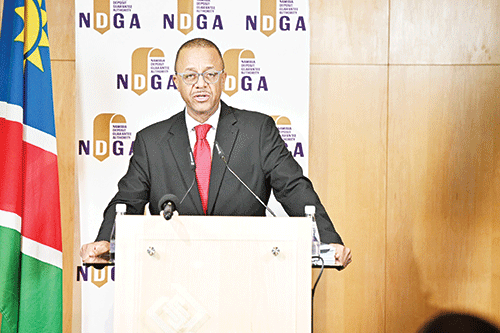DEPUTY governor of the Bank of Namibia, Ebson Uanguta says massive capital injections into the domestic economy by the government, such as the Targeted Intervention Programme for Employment and Economic Growth (TIPEEG), should be used to prop up the economy, particularly at times when economic growth is found wanting.
TIPEEG was a three-year initiative adopted about a decade ago to address high unemployment, and to support strategic sectors with high growth and high jobs’ potential.
TPEEG came to an end on 31 March 2014 with a total budget outlay, including public works, of approximately N$14.7 billion. Out of this allocation, government spent some N$13.1 billion, representing an overall execution rate of 88.9%. These figures were recently shared by deputy finance minister Maureen Hinda-Mbuende in the National Assembly.
In the first financial year (2011/2012) of the project, a total budget of N$5.8 billion was allocated, of which N$4.8 billion was spent and 39 607 jobs created. For the financial year 2012/2013, a budget of N$4 billion was allocated, of which N$3.5 billion was spent, and a reported 35 821 jobs created. For the 2013/2014 financial year, which was the final year, a total budget of N$5 billion was allocated, of which N$4.7 billion was spent and 27 312 jobs created.
Uanguta believes these figures have significantly supported economic growth.
“When we had TIPEEG, government was injecting a lot of money. If that money was taken by entrepreneurs and invested substantially in the economy, our economy could have been on a very different trajectory. But if we take that level of investment and invest in things that are not productive to the economy, the moment government slows down, then nothing is there to hold on to,” he said last week.
He was speaking during the third edition of the taxpayer/trader appreciation day organised by the Namibia Revenue Agency (NamRA). The event took place under the theme, ‘Expecting Taxpayers and Traders to Positively Impact the Livelihood of Namibians through Compliance’.
The appreciation day was intended to promote voluntary compliance, and enhance tax morale by recognising and appreciating compliant taxpayers and traders, who continue to conform to the relevant laws administered by NamRA.
During his address, Uanguta said taxation plays a crucial role in supporting economic growth by providing funds for government initiatives, infrastructure projects and job-reation.
“It is also very important for the government to channel taxpayers’ resources into productive economic projects that are beneficial to the community. There must be a balance in terms of obligation to pay, and obligation to make sure that as we are receiving this, we use for productive course,” he advised. -mndjavera@nepc.com.na



